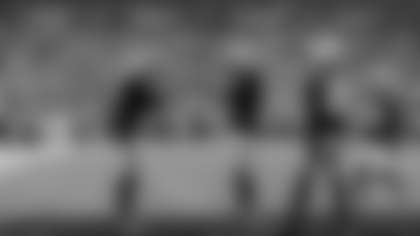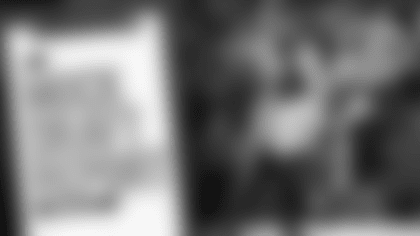SPARTANBURG, S.C. – No one can question the intent of a new rule implemented with player safety in mind that bans the initiating of contact with the helmet by any of the 22 players on the field.
But, as head coach Ron Rivera learned even before a group of game officials arrived for a two-day stay at training camp to answer questions for coaches, players and media, the rule was added for the right reasons but is going to be a challenge for officials to consistently get right.
"When I first saw it, I thought, 'Oh, he led with the head,'" Rivera said of rookie safety Rashaan Gaulden's hard hit to receiver Jarius Wright earlier in the week. "But when you go back and look at it, you can see he hits with the shoulder first. But think about it: I was pretty much in position where the referee would be."
Referees must first access in real time if the helmet was involved, then they must decide if the player was instigating with his helmet (a 15-yard penalty) or bracing for contact with his head (a legal play). If the player led with his helmet, refs must then decide on the fly whether the contact was "egregious" enough – the word used by side judge and Charlotte resident Boris Cheek – to justify ejection (there are specific parameters to consider).
"This is something we'll work on the preseason and that I'm sure we'll screw down tighter as we go," Cheek said. "Obviously when you have a change, there's an adjustment period for everybody."
Line judge Jeff Seeman pointed out that with game experience and film study, the play will "slow down" in the way that officials process it, but there will be a learning process for all involved.
"We need to be good at this coming out of the gate," Seeman said, "but it takes time to get good at it."
Seeman did point out that when it comes to ejections, officials will literally be able to slow things down. It will be up to game officials to initially rule if a player should be ejected, but Seeman said the replay center at NFL headquarters can review it and rule that the contact wasn't worthy of ejection.
"They'll do the best they can," Rivera said, "and we've just got to abide by what the rule is.
"Guys are still going to run around fast and try to make plays on the ball. It's just a matter of getting your head out, of using your shoulders, your chest plate, your arms to hit and wrap. As long as the head is incidental, that's acceptable, but it will be interesting to see how it's interpreted."
-How the helmet rule will impact the game is such a hot-button issue that many seem to have almost forgotten that the latest incarnation of the catch rule will take affect this season. When game officials opened the floor to the media for questions Thursday, they got several about the helmet rule and virtually none about the catch rule.
Perhaps after all the confusion in recent years, they don't know where to begin with the questions. Perhaps the new rule has answered all their questions. But more likely, it's a situation where observers will have to observe how it plays out before asking questions.
To review, the new rule says it's a catch once the receiver controls the ball, gets two feet or another body part (not including one foot or a hand) on the ground inbounds and then completes or could have completed a football move (such as taking a third step or extending the ball to gain extra yardage).
-The points of emphasis this year are highlighted by a crackdown on illegal contact by those covering a would-be receiver. In-depth discussions of that at practice Thursday led to some lighter moments between safety Mike Adams and field judge Anthony Jeffries.
On a tussle in the end zone for a pass close to the ground between Adams and DJ Moore, Jeffries let fly a flag for illegal contact on Adams, saying the veteran pushed the rookie away before the pass was completed.
"He's a rookie," Adams said.
Adams was talking about Jeffries, not Moore. After a lengthy discussion with Jeffries and other officials, Adams acknowledged some understanding of the call, but he added one parting shot.
"You ain't going to the Super Bowl," Adams said.
And he's right: Rookie game officials aren't eligible for Super Bowl consideration.







